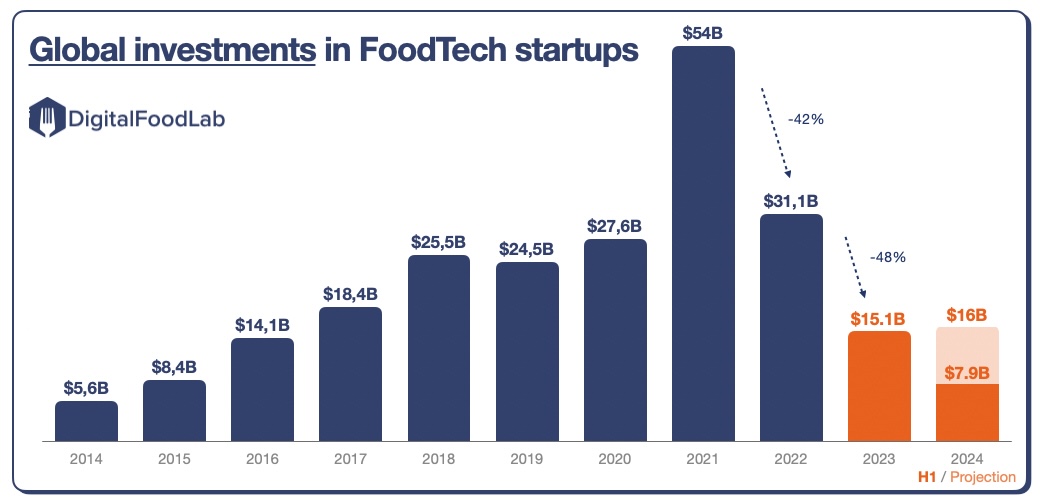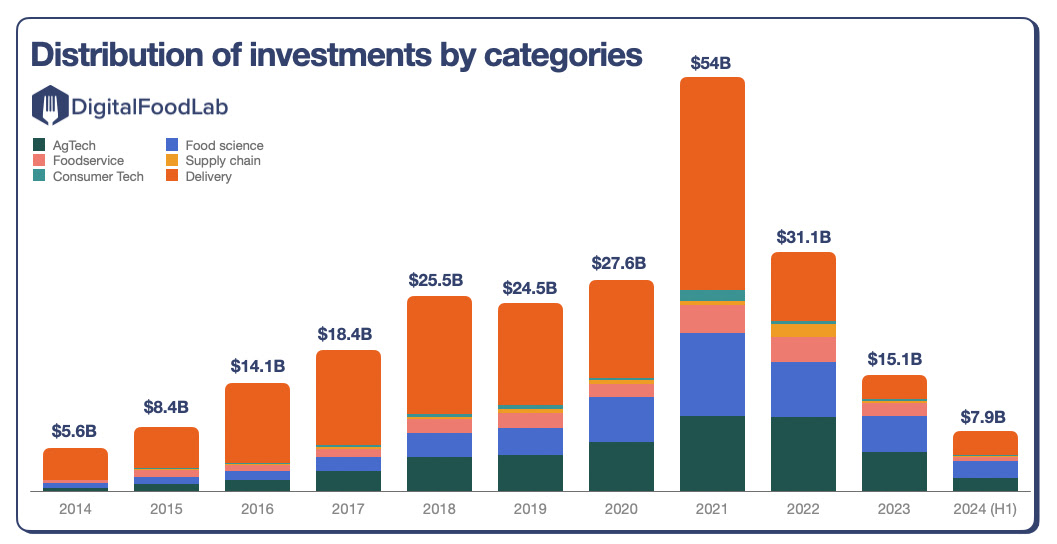Food Tech Funding ‘Bouncing Back’, But Investor Doubts on Alternative Proteins Still Persist
5 Mins Read
As inflation eases, food tech investments are showing signs of recovery, but companies within the alternative protein ecosystem are treading different paths.
While food tech venture capital dipped by 48% in 2023 (reaching $15.3B), investor interest in this sector is bouncing back, according to a new report by French strategy consultants DigitalFoodLab.
In the first half of 2024, food tech startups already attracted $7.9B – just over 50% of the 2023 total, indicating that the industry is no longer suffering from the funding declines of the last two years.
“The slight bounce back that we observed in the first half of the year is mostly due to a handful of larger deals in delivery startups,” says Matthieu Vincent, co-founder and partner at DigitalFoodLab. “At the end of the day, it shows that there is renewed trust in this ecosystem (delivery) as inflation is slowing down.”

Despite early-stage investments remaining strong in 2022 and 2023, the first six months of this year saw seed funding rounds fall dramatically from $2B in 2023 to less than $700 million. The wave of food tech financing driven by late-stage deals – at $3B, Series D+ and private equity deals nearly matched last year’s total of $3.3B.
“This is only a point of attention, but it could become worrying if it continues, as early-stage investments are fundamental in developing a healthy ecosystem,” the report notes.
Alternative proteins charting different courses

After the 2020-21 peak, when funding was at record levels, inflationary concerns and high interest rates combined to lower investor interest. But now, as the situation normalises, investment activity has reached a “new plateau”.
While delivery is still king, upstream and midstream technologies are taking centre stage. This includes AgTech and Food Science startups (the latter comprises alternative proteins and new food products) – and there has also been a surge in collaborations between companies in these two segments.
Food Science players made up 28% of the industry’s investments last year, reaching $4.7B. In the first half of 2024, these startups have already raised $2B, thanks to large rounds like Meati‘s $100M Series C and Perfect Day‘s $90M pre-Series E.
Investments into brands showcasing new food and drink products are helping the overall category, but “there is a wave of doubts about the ability of alternative protein startups to deliver results in the short term”, according to the report.
Vincent explains that the alternative protein ecosystem is encompassing three “increasingly different paths”. For brands making plant-based analogues, sales have decreased despite consolidation in the category. “We can’t have a call with an investor without hearing: ‘We don’t want to look at that space,'” says Vincent.
“However, we still feel optimistic about this space and expect that as inflation decreases, consumers will go back to experiment with these products, but maybe not before mid-2025.”
Then there are the companies dealing with precision fermentation or cultivated meat. “Doubts are still running high on the ability of the startups to ever reach price parity, and more importantly on their ability to fund their scale-up (or build the facilities),” Vincent explains.
But on the positive side, functional ingredient makers – innovating with sugar, fats, egg proteins, and more – are enjoying sustained interest. “This category is actually doing really well with increased investment, lots of partnerships with large companies and a significant appetite from investors,” says Vincent.
“That’s why we see more and more startups rebranding themselves from ‘protein producer’ to ‘specialty or functional ingredient manufacturer’,” he adds.
Investors eye Europe as Asia suffers

No region was spared from the investment declines over the last couple of years, but this year, Europe is surging forward. According to the report, the region was “slightly less affected” by the challenges.
This builds on previous research focused on climate-centric food tech companies, which found that Europe overtook the US in funding for the first time last year, making up 58% of global investments. This is also seen in the alternative protein world – Europe has accounted for 48% of all venture capital in this space in the first half of 2024.
“Europe had been ignored for some time, maybe due to the old continent being slow to structure its innovation ecosystem (incubators, business angels, etc.),” says Vincent. But the emergence of large delivery startups with an international focus has “definitely helped put the continent on the global food tech map”.
Meanwhile, despite India receiving the second-largest sum of money between the start of 2023 and the first half of 2024 (behind only the US), Asia – once the leader in food tech investments – is witnessing a decline in its share of funding.
Vincent ascribes this to two factors: a strong decline in delivery investments, where Asian (and specifically Chinese) startups were among the first to raise huge amounts of money; and “doubts from foreign investors about their ability to invest in China”. He adds: “We should note that there are many bright spots in Asia, from Singapore to Indonesia.”
Despite the global trends this year, Vincent is exercising caution. “We expect the same levels of investments, maybe slightly lower, due to the current economic and political situation,” he says. “However, we expect a visible bounce back for 2025.”
According to the report, this revival will begin in the US and eventually materialise in Europe, though the speed of movement will be slow as the number of “fundable startups” has decreased and investors have upped their requirements. “We may have to wait for 2026 (at least) to see a substantial uptick where we could come back to the levels of funding of 2020,” the report says.



